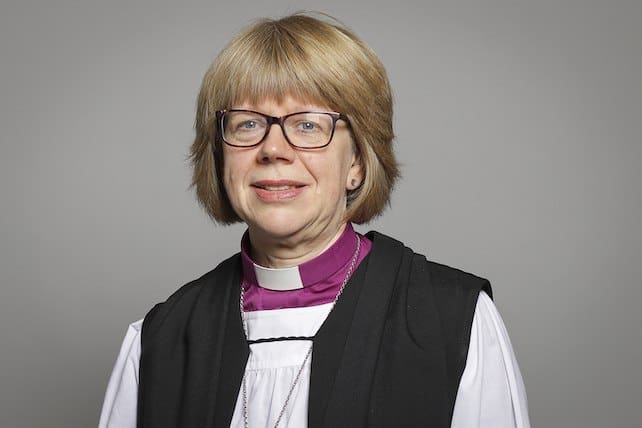Gafcon, a conservative movement of Anglicans across Africa and Asia, disapproves of female bishops and said it received today’s news “with sorrow.” The Most Rev. Dr. Laurent Mbanda, chair of the Gafcon Primates Council, wrote, “This appointment abandons global Anglicans, as the Church of England has chosen a leader who will further divide an already split Communion.”
Dr. Danielle Treweek, a theological researcher and ordained Anglican deacon, posted a link to Mbanda’s statement and quoted it: “Today’s appointment makes it clearer than ever before that Canterbury has relinquished its authority to lead.”
Because most of Anglican Church “still believes that the Bible requires a male-only episcopacy,” Mbanda wrote, Mullally’s appointment “will make it impossible for the Archbishop of Canterbury to serve as a focus of unity within the Communion.”
In his statement, Mbanda criticized Mullally for promoting “unbiblical and revisionist teachings regarding marriage and sexual morality.” He concluded, “We pray that as she takes upon herself the weight of this historic office, she will repent, and earnestly work with the Gafcon leadership to mend the torn fabric of our Anglican Communion.”
Mullally, who is considered progressive on social issues, has said clergy can bless some same-sex relationships.
Stephen Cottrell, Archbishop of York, said he was “delighted” by Mullally’s appointment, calling her “a person of huge courage, wisdom, integrity and experience.”
Other people praised the new Archbishop of Canterbury for being an outspoken advocate for women. In a 2012 blog about abortion, Mullally indicated she leaned more toward the pro-choice side of the issue.
The Role of the Archbishop of Canterbury
The Anglican Communion has more than 85 million members in 165 countries. Each national Anglican church has a leader, but the Archbishop of Canterbury is considered “first among equals.”
The Anglican Communion, which first ordained female priests in 1994, has allowed female bishops since 2014. Woman now account for about one-third of all Anglican bishops in England. Justin Welby was named Archbishop of Canterbury in 2013, so this is the first time women were eligible for the role.
The Archbishop of Canterbury serves as the most senior leader of the Church of England, just below the king, its supreme governor. In addition to overseeing the church’s direction and laws, the Archbishop of Canterbury sits in the British House of Lords and supervises military chaplains.
RELATED: After Disastrous Farewell Speech, Archbishop of Canterbury Goes Quiet for Holidays
“The Church of England is of profound importance to this country,” said Prime Minister Starmer on Mullally’s appointment. “Its churches, cathedrals, schools, and charities are part of the fabric of our communities.”
Selecting a new Archbishop of Canterbury is a lengthy, secretive process. The nominating commission was led by Jonathan Evans, a former director-general of Britain’s M15 security service. He had said he wanted to avoid choosing from only “white, Oxbridge, male” church leaders. No shortlist of candidates is announced, but experts had speculated that at least two other females were in consideration.
Andrew Gross, a scholar of the monarchy and religion, had said the naming of a female Archbishop of Canterbury “would be a very significant moment if it happens.” He added, “If you can have a female prime minister, you have a female monarch…why can’t you have the female Archbishop of Canterbury?”

